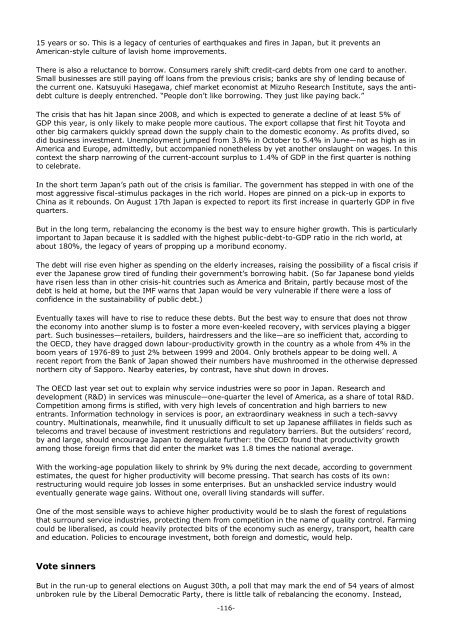Untitled - the ultimate blog
Untitled - the ultimate blog
Untitled - the ultimate blog
Create successful ePaper yourself
Turn your PDF publications into a flip-book with our unique Google optimized e-Paper software.
15 years or so. This is a legacy of centuries of earthquakes and fires in Japan, but it prevents an<br />
American-style culture of lavish home improvements.<br />
There is also a reluctance to borrow. Consumers rarely shift credit-card debts from one card to ano<strong>the</strong>r.<br />
Small businesses are still paying off loans from <strong>the</strong> previous crisis; banks are shy of lending because of<br />
<strong>the</strong> current one. Katsuyuki Hasegawa, chief market economist at Mizuho Research Institute, says <strong>the</strong> antidebt<br />
culture is deeply entrenched. “People don’t like borrowing. They just like paying back.”<br />
The crisis that has hit Japan since 2008, and which is expected to generate a decline of at least 5% of<br />
GDP this year, is only likely to make people more cautious. The export collapse that first hit Toyota and<br />
o<strong>the</strong>r big carmakers quickly spread down <strong>the</strong> supply chain to <strong>the</strong> domestic economy. As profits dived, so<br />
did business investment. Unemployment jumped from 3.8% in October to 5.4% in June—not as high as in<br />
America and Europe, admittedly, but accompanied none<strong>the</strong>less by yet ano<strong>the</strong>r onslaught on wages. In this<br />
context <strong>the</strong> sharp narrowing of <strong>the</strong> current-account surplus to 1.4% of GDP in <strong>the</strong> first quarter is nothing<br />
to celebrate.<br />
In <strong>the</strong> short term Japan’s path out of <strong>the</strong> crisis is familiar. The government has stepped in with one of <strong>the</strong><br />
most aggressive fiscal-stimulus packages in <strong>the</strong> rich world. Hopes are pinned on a pick-up in exports to<br />
China as it rebounds. On August 17th Japan is expected to report its first increase in quarterly GDP in five<br />
quarters.<br />
But in <strong>the</strong> long term, rebalancing <strong>the</strong> economy is <strong>the</strong> best way to ensure higher growth. This is particularly<br />
important to Japan because it is saddled with <strong>the</strong> highest public-debt-to-GDP ratio in <strong>the</strong> rich world, at<br />
about 180%, <strong>the</strong> legacy of years of propping up a moribund economy.<br />
The debt will rise even higher as spending on <strong>the</strong> elderly increases, raising <strong>the</strong> possibility of a fiscal crisis if<br />
ever <strong>the</strong> Japanese grow tired of funding <strong>the</strong>ir government’s borrowing habit. (So far Japanese bond yields<br />
have risen less than in o<strong>the</strong>r crisis-hit countries such as America and Britain, partly because most of <strong>the</strong><br />
debt is held at home, but <strong>the</strong> IMF warns that Japan would be very vulnerable if <strong>the</strong>re were a loss of<br />
confidence in <strong>the</strong> sustainability of public debt.)<br />
Eventually taxes will have to rise to reduce <strong>the</strong>se debts. But <strong>the</strong> best way to ensure that does not throw<br />
<strong>the</strong> economy into ano<strong>the</strong>r slump is to foster a more even-keeled recovery, with services playing a bigger<br />
part. Such businesses—retailers, builders, hairdressers and <strong>the</strong> like—are so inefficient that, according to<br />
<strong>the</strong> OECD, <strong>the</strong>y have dragged down labour-productivity growth in <strong>the</strong> country as a whole from 4% in <strong>the</strong><br />
boom years of 1976-89 to just 2% between 1999 and 2004. Only bro<strong>the</strong>ls appear to be doing well. A<br />
recent report from <strong>the</strong> Bank of Japan showed <strong>the</strong>ir numbers have mushroomed in <strong>the</strong> o<strong>the</strong>rwise depressed<br />
nor<strong>the</strong>rn city of Sapporo. Nearby eateries, by contrast, have shut down in droves.<br />
The OECD last year set out to explain why service industries were so poor in Japan. Research and<br />
development (R&D) in services was minuscule—one-quarter <strong>the</strong> level of America, as a share of total R&D.<br />
Competition among firms is stifled, with very high levels of concentration and high barriers to new<br />
entrants. Information technology in services is poor, an extraordinary weakness in such a tech-savvy<br />
country. Multinationals, meanwhile, find it unusually difficult to set up Japanese affiliates in fields such as<br />
telecoms and travel because of investment restrictions and regulatory barriers. But <strong>the</strong> outsiders’ record,<br />
by and large, should encourage Japan to deregulate fur<strong>the</strong>r: <strong>the</strong> OECD found that productivity growth<br />
among those foreign firms that did enter <strong>the</strong> market was 1.8 times <strong>the</strong> national average.<br />
With <strong>the</strong> working-age population likely to shrink by 9% during <strong>the</strong> next decade, according to government<br />
estimates, <strong>the</strong> quest for higher productivity will become pressing. That search has costs of its own:<br />
restructuring would require job losses in some enterprises. But an unshackled service industry would<br />
eventually generate wage gains. Without one, overall living standards will suffer.<br />
One of <strong>the</strong> most sensible ways to achieve higher productivity would be to slash <strong>the</strong> forest of regulations<br />
that surround service industries, protecting <strong>the</strong>m from competition in <strong>the</strong> name of quality control. Farming<br />
could be liberalised, as could heavily protected bits of <strong>the</strong> economy such as energy, transport, health care<br />
and education. Policies to encourage investment, both foreign and domestic, would help.<br />
Vote sinners<br />
But in <strong>the</strong> run-up to general elections on August 30th, a poll that may mark <strong>the</strong> end of 54 years of almost<br />
unbroken rule by <strong>the</strong> Liberal Democratic Party, <strong>the</strong>re is little talk of rebalancing <strong>the</strong> economy. Instead,<br />
-116-








![[ccebbook.cn]The Economist August 1st 2009 - the ultimate blog](https://img.yumpu.com/28183607/1/190x252/ccebbookcnthe-economist-august-1st-2009-the-ultimate-blog.jpg?quality=85)



![[ccebook.cn]The World in 2010](https://img.yumpu.com/12057568/1/190x249/ccebookcnthe-world-in-2010.jpg?quality=85)
![[ccemagz.com]The Economist October 24th 2009 - the ultimate blog](https://img.yumpu.com/5191885/1/190x252/ccemagzcomthe-economist-october-24th-2009-the-ultimate-blog.jpg?quality=85)